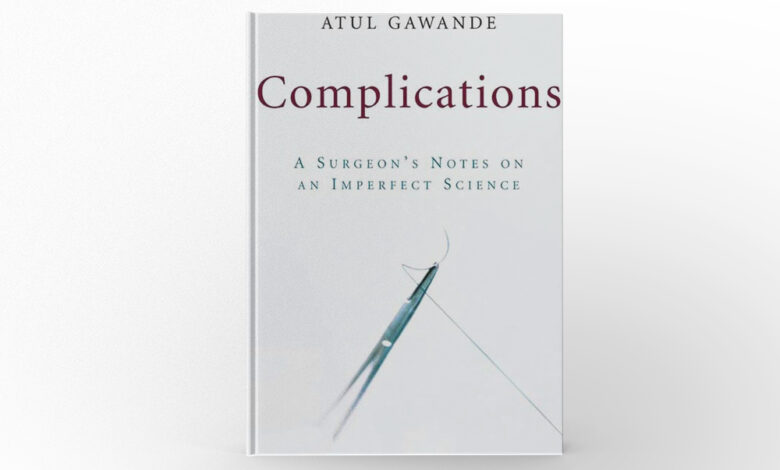Complications: A Surgeon’s Notes on an Imperfect Science by Atul Gawande
Complications: A Surgeon’s Journey Through the Imperfections of Medicine

“Complications: A Surgeon’s Notes on an Imperfect Science” by Atul Gawande is a compelling exploration of the complexities and uncertainties inherent in the field of medicine. This book, first published in 2002, offers readers a candid look at the challenges and ethical dilemmas faced by surgeons. In this article, we will delve into the various aspects of “Complications,” providing an in-depth summary, examining its themes, and discussing its lasting impact and legacy.
Author’s Background
Atul Gawande is a renowned surgeon, writer, and public health researcher. Born in 1965, Gawande has made significant contributions to both the medical field and literature. He is a practicing surgeon at Brigham and Women’s Hospital in Boston and a professor at Harvard Medical School and the Harvard T.H. Chan School of Public Health. Gawande’s writing career began with contributions to The New Yorker, where he gained recognition for his insightful and thought-provoking essays on medicine. “Complications” is his first book, and it has been praised for its eloquent prose and deep exploration of medical practice.
In-Depth Summary
“Complications” is divided into three main sections: Fallibility, Mystery, and Uncertainty. Each section contains a series of essays that illustrate the imperfections and challenges of modern medicine.
- Fallibility: This section explores the human errors and mistakes that occur in medical practice. Gawande shares personal anecdotes and case studies that highlight the fallibility of surgeons. One notable essay, “When Doctors Make Mistakes,” examines the psychological and professional impact of medical errors. Gawande candidly discusses his own experiences with surgical mistakes, emphasizing the importance of transparency and learning from errors.
- Mystery: In this section, Gawande delves into the enigmatic aspects of medicine. He explores cases where the cause of a patient’s symptoms is unclear, and the diagnostic process becomes a journey of discovery. The essay “The Case of the Red Leg” recounts a puzzling case of a patient with a mysterious leg infection. Gawande’s narrative captures the tension and uncertainty that doctors face when confronted with medical mysteries.
- Uncertainty: The final section addresses the inherent uncertainties in medical practice. Gawande discusses the limitations of medical knowledge and the difficulty of making decisions in the face of incomplete information. In “The Pain Perplex,” he examines the complexities of diagnosing and treating chronic pain. Gawande’s reflections on the uncertainty of medicine underscore the need for humility and continuous learning in the medical profession.
Themes and Insights
“Complications” explores several key themes, including:
- Human Fallibility: Gawande emphasizes that doctors are human and prone to making mistakes. He advocates for a culture of openness and learning from errors to improve patient care.
- The Complexity of Medicine: The book highlights the intricate and often unpredictable nature of medical practice. Gawande’s case studies illustrate the challenges of diagnosing and treating patients, emphasizing that medicine is as much an art as it is a science.
- Ethical Dilemmas: Gawande addresses the ethical challenges faced by doctors, such as balancing patient autonomy with medical judgment and navigating the pressures of the healthcare system.
- The Importance of Communication: Effective communication between doctors and patients is a recurring theme. Gawande stresses the need for clear and compassionate communication to build trust and ensure better patient outcomes.
Personal Reflections
Reading “Complications” was an enlightening and thought-provoking experience. Gawande’s masterful storytelling and candid reflections brought the world of surgery to life. His willingness to share his own mistakes and uncertainties made the book deeply relatable and human. The exploration of themes such as fallibility, complexity, and ethical dilemmas prompted me to reflect on the broader implications of medical practice. “Complications” is a book that stays with you long after you’ve turned the last page, and I am grateful for the insights and emotions it has evoked.
Recommendation
“Complications” is a must-read for anyone interested in medicine, ethics, or human behavior. Atul Gawande’s sharp writing and insightful analysis make this book a standout in the genre of medical literature. Whether you’re a healthcare professional or a layperson, “Complications” offers a compelling and unforgettable reading experience. Its exploration of the imperfections and challenges of medicine will leave you questioning and reflecting long after you’ve finished the book.
Impact and Legacy
Since its publication, “Complications” has had a significant impact on the literary and medical communities. The book’s success has led to numerous accolades, including being a finalist for the National Book Award. Gawande’s work has influenced countless healthcare professionals, encouraging a culture of transparency and continuous improvement in medical practice.
“Complications” has also sparked important conversations about the nature of medical errors and the need for systemic changes in healthcare. Gawande’s candid exploration of the imperfections of medicine has resonated with readers and inspired discussions about patient safety and the ethical responsibilities of doctors.
The book’s popularity and critical acclaim have solidified Atul Gawande’s reputation as a leading voice in medical literature. “Complications” remains a cornerstone of contemporary nonfiction, offering invaluable insights into the complexities of medical practice and the human condition.
Conclusion
In conclusion, “Complications: A Surgeon’s Notes on an Imperfect Science” by Atul Gawande is a powerful and transformative book that offers readers a gripping and thought-provoking exploration of the challenges and uncertainties of medicine. Its intricate narratives, complex characters, and sharp writing make it a standout work in the field of medical literature. Whether you’re revisiting the book or discovering it for the first time, “Complications” offers invaluable insights and a truly unforgettable reading experience.





